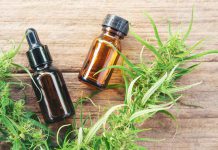Marijuana legalization is being adopted by many states, even for recreational use. As of now, marijuana is legal for adults in 11 states, as well as the nation’s capital. But possessing marijuana in quantities of under 35 grams is still considered a misdemeanor offense in Missouri, it’s entirely possible that products derived from the cannabis plant could soon be considered mere dietary supplements — that is, if a newly reintroduced congressional bill should pass.
Showing a rare form of solidarity in current American politics, a bipartisan group of lawmakers recently introduced a bill that was first presented to Congress last year. Called the Hemp and Hemp-Derived CBD Consumer Protection and Market Stabilization Act, the law would instate clear regulations for the hemp industry and allow CBD products to be marketed as dietary supplements.
Although the H.R. 841 bill is identical to H.R. 8179, a bill first introduced in the last Congress, lawmakers are hopeful that this reintroduction could be more positively received due to its support across party lines. After lawmakers have failed to convince the FDA to adopt regulations pertaining to marketing and guidance, representatives are hoping to bypass these issues by formally making hemp subject to regulations established for other dietary supplements (save cannabis products containing THC, the psychoactive compound found in marijuana).
Currently, approximately 20% of adults believe the U.S. healthcare system was ill-prepared for dealing with the nation’s aging population. And while this bill would not address the issues plaguing many Americans in regard to healthcare coverage, it could provide greater accessibility and awareness surrounding natural treatments like CBD for mental health issues, chronic pain, and more — many of which impact older folks, as well as people of all ages. If the bill were to pass, the legalities surrounding hemp-derived CBD would be much clearer and would make it far easier to promote CBD products in a safe way to consumers. The legislation would also prompt the FDA to finally take action and could even provide financial assistance to hemp farmers who have struggled to survive.
But most importantly, the bill would also require manufacturers to comply with the Dietary Supplement Health and Education Act, which ensures safety, proper labeling, and general compliance across the board. As of now, there’s very little regulatory oversight regarding CBD products, which can make it difficult for consumers know which brands or products to trust. Although CBD shows a lot of promise as an alternative to prescription pain medication, in many situations (as does physical therapy, especially when sought within two weeks of an injury), the lack of regulations and overall visibility can make would-be CBD users rightfully nervous.
While the bill has retained the support of a number of hemp-related and dietary organizations like the U.S. Hemp Roundtable, the Council for Responsible Nutrition, the American Herbal Products Association, and others, some members of Congress would rather defer to the FDA on such matters. But given that the federal agency has dragged its proverbial feet, according to lawmakers, many say it’s clear that they need a push to take the next logical step.
According to Julia Gustafson, the vice president of government relations for the Council for Responsible Nutrition, the bill could act as that much-needed push. “Due to continued FDA inaction,” Gustafson explained in a statement, “more consumers are at risk every day of unsafe or illegal products that are poorly manufactured, incorrectly labeled, or illegally deliver THC or other adulterants. Concurrently, responsible CBD companies that adhere to federal regulations and product and market safe and beneficial CBD dietary supplements are forced to share the shelf with disreputable companies that compromise public safety for profit.”
Michael McGuffin, the president of the American Herbal Products Association and a coalition partner, added in a statement: “There remains an absence of substantive progress on FDA’s reported attention to creating a lawful pathway for CBD, and a similar lack of clarification from the agency that simple hemp products, such as tinctures and extracts, should be regulated the same as other herbal supplements. This legislation will fill those gaps, and we see it as important for ensuring that consumers will be able to find hemp and CBD products that are clearly subject to FDA’s enforcement of the robust regulations that apply to all other herbal supplements.”
Whether or not the bill will be signed into law remains to be seen. But if it does, it could make it much easier and safer for Americans to utilize this alternative that shows so much promise for overall health.








